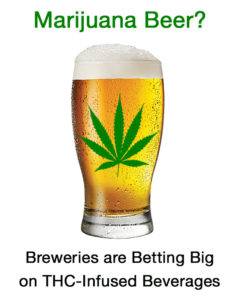written for Inspire Malibu
The sale and use of recreat ional marijuana in the U.S., as of 2018, is legal in 10 states and the District of Columbia (DC). In total, 33 states allow for legal consumption – medicinal or recreational marijuana – in some regulated form or fashion. Despite the federal government’s schedule I classification of the leafy substance, the weed-industry is growing…well, yeah, like a weed.
ional marijuana in the U.S., as of 2018, is legal in 10 states and the District of Columbia (DC). In total, 33 states allow for legal consumption – medicinal or recreational marijuana – in some regulated form or fashion. Despite the federal government’s schedule I classification of the leafy substance, the weed-industry is growing…well, yeah, like a weed.
California based Lagunitas Brewing Company, owned by Heineken, is one of the first on the market with a non-alcoholic pot-brew, called Hi-Fi Hops – AbsoluteXtracts.
Hi-Fi Hops, which some reviewers describe as a hoppy tasting sparkling water, comes in two doses. One is made solely with 10mg of THC, the psychoactive ingredient in marijuana. The second is a combination of 5mg THC and 5mg CBD (cannabidiol) for a more relaxed, less “high” experience.
The brew is currently available in select California dispensaries and retails for around $8. Heineken isn’t the only company jumping into the marijuana business.
According to Forbes, the U.S. accounted for 90 percent of the $9.5 billion worldwide cannabis market in 2017. Big name beverage companies, like Molson Coors, are investing in cannabis products. Even Coca-Cola announced an interest in (CBD)-infused beverages after the 2018 Farm Bill removed hemp from the controlled substances list.
For “pot-preneurs,” the future seems bright, but health care experts grumble about the disparity between marijuana availability and the lack of research into its long-term effects on users. Because the government maintains pot as a schedule I narcotic, a substance with little to no medicinal use and a high likelihood for abuse, very few well funded studies on marijuana have been done.
Researchers at Harvard’s T.H. Chan School of Public Health examined more than 10,000 marijuana studies. Their conclusion was that no clear guidelines on populations that might benefit or be harmed by different cannabis doses and “delivery mechanisms” exist with the available data.
“What is the right public health message to send to adults who can now legally buy and use marijuana?” the L.A. Times Editorial Board wrote just after the end of marijuana prohibition in California.
In fact, there is evidence that suggests legalizing pot in one form or another has some negative consequences, such as some of the following:
- Among eighth and 10th graders in Washington, marijuana use increased after legalization, according to the National Institutes of Health, though this did not occur among Colorado teens
- Some states are seeing an increase in drivers who are under the influence of marijuana
- Pot-potency, the amount of THC in it, has increased from an average 3.7 percent in the ’90’s to as high as 50 to 88 percent in newer products, which effects people in vastly different ways
Clearly some populations are more vulnerable as it relates to easily accessible cannabis. For instance, corporations that advertise new pot products should – like tobacco companies are required – avoid marketing toward minors. People struggling with or in recovery from drug and alcohol addiction are another demographic that will, no doubt, find ways to avoid triggers that lead to a marijuana relapse.
It seems unlikely that companies like Heineken or Molson Coors or any other beverage juggernauts getting in the marijuana-game are going to slow down production of pot-infused products. In a $10 billion plus market, creating awareness campaigns that lessen the stigma around addiction and create greater awareness about treatment would be a helpful way to spend just a small portion of their profits.
Perhaps if the federal government ever comes around to legalizing recreational marijuana, it can mandate that corporations must do more than just try to promote their products responsibly.
